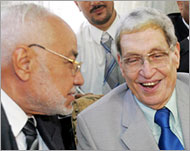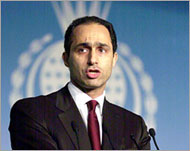Egyptian opposition in crisis
Almost a month after their poor showing in legislative elections, Egyptian opposition parties are embroiled in coups, divisions and scathing self-criticism.

The two main contenders and party leaders who competed against Hosni Mubarak, the president, in the first multi-candidate presidential elections last September have been dramatically dethroned.
The man who came a distant second to Mubarak, Ayman Nour, head of al-Ghad party, is now in prison serving a five-year sentence for forging his party’s membership applications – a crime he denies and says is politically motivated.
Such political disarray, observers say, does not augur well for Egypt’s hoped for post-election democratic transformation.
In-fighting
In-fighting among the opposition parties is no secret.
Ahead of the November parliamentary elections, a number of al-Ghad’s founders attempted a failed coup against Nour and announced a new leadership. The dispute has gone to court.
 |
|
Al-Wafd leader Noaman Gomaa |
But the al-Wafd party crisis has proved more spectacular.
Noaman Gomaa, head of the liberal al-Wafd – Egypt’s oldest political party which finished third in the presidential election – was ousted in a sensational coup by his party’s high committee members on Wednesday.
He was replaced temporarily by Mahmoud Abaza, the party’s deputy president, until al-Wafd’s general assembly elects a new president on 2 March.
But the repercussions of al-Wafd’s upheaval, which dominated the front pages of the local media in Egypt for days, are far from over.
Sign of demise
Politicians and pundits fear it is a sign of the demise of the nation’s political parties.
Hassan Nafaa, a political science professor at Cairo University, says: “When Egypt’s oldest and biggest opposition party begins to collapse, it is normal for the national political forces of this country … to view this as sign and evidence of how the entire multi-party experience is falling apart.”
|
“When Egypt’s oldest and biggest opposition party begins to collapse, it is normal for the national political forces of this country … to view this as sign and evidence of how the entire multi-party experience is falling apart” Hassan Nafaa, political science professor, Cairo University |
The results of November’s parliamentary elections back this view.
Out of 444 contested parliamentary seats, official political parties won only nine (al-Wafd 6, Tagammu 2, al-Ghad 1). The Nasserist party failed to win any seats.
Unofficial groups outdid those with legal status.
The banned but tolerated Muslim Brotherhood won 88 seats, almost a fifth of parliament. And eight seats went to independent candidates of the “civil opposition”, including two to the nationalist al-Karama (Dignity) party, which was denied a licence to form a legal opposition party.
Mubarak’s ruling National Democratic Party (NDP) won 73% of the seats.
Hamdeen Sabahi, al-Karama’s president and member of parliament, told Aljazeera.net: “The role of legal political parties is ending, and if these parties remain alive, they’ll be much weaker than they are now.”
Nasserist
Frustrated with its stagnation, Sabahi and others defected from the Nasserist party to form al-Karama in 1999.
Although the move weakened the Nasserist party, its daring mouthpiece, the newspaper Al-Araby and its editors Abdallah El-Sennawi and Abdel-Halim Qandil, remained as a reminder that the party was not dead.
 |
|
President Mubarak is said to be |
At a time when it was strictly taboo, Al-Araby was the first opposition paper to campaign against the rumoured grooming of Mubarak’s oldest son Gamal to succeed his father.
In November 2004, Qandil paid the price for dissent when he was kidnapped, beaten up and left naked in the desert by thugs.
Despite incessant pressures on the Nasserist party to clamp down on Al-Araby, the mouthpiece pursued its caustic critique of Mubarak, the growing powers of his wife and son and the political establishment.
But three weeks ago, both Qandil and El-Sennawi suddenly announced their departure from Al-Araby, triggering speculation about the future of the paper which is expected to tone down.
The decision was followed by the resignation of Ahmed Yassin Nassar, a prominent figure in the Nasserist party, to protest against the party’s poor showing in the elections and its “disconnection” from the street.
And according to al-Karama’s Sabahi, “migrations” from the Nasserist party to Al-Karama are occurring.
Although El-Sennawi cites professional reasons for leaving, related to the dismal funding of the Al-Araby and the need for change, he acknowledged chronic problems in the Nasserist party.
Tagammu
While no defections have been reported in the left-wing Tagammu party, many of its prominent figures have been publicly criticising its performance in the parliamentary elections, the mellowness of its mouthpiece Al-Ahaly and the party’s wavering relationship with the government.
|
“The curtain has been drawn on all the legal political parties and new formations are in the making… There is the corrupt NDP or the Islamic Muslim Brotherhood. What about all the people who want a third way?” George Ishak, |
Abdel-Ghafar Shokr, the leader of Tagammu leader, says the party’s politburo held three meetings in the past month to address the crisis.
He said they were devising suggestions and solutions to try to give the party “a six-month chance” for improvement.
“If that doesn’t work, the central committee will meet and we might consider a change in leadership,” he said.
Third way
While such confusion could usher in the demise of the so-called multi-party system in Egypt, it is hardly the end of politics.
Mustafa Kamel El-Sayed, a political scientist at the American University in Cairo, describes the current political trend as “a process of contestation”.
“But it’s too early to judge if it will lead to their demise or transformation.”
George Ishak, Kifaya’s spokesman, believes “the curtain has been drawn on all the legal political parties and new formations are in the making”.
He told Aljazeera.net: “There is the corrupt NDP or the Islamic Muslim Brotherhood. What about all the people who want a third way?”
 |
|
Gamal Mubarak, has long spoken |
While Kifaya and al-Karama say they offer that alternative, al-Wafd party’s so-called reformists, who ousted Gomaa over the weekend, insist their coup will revive the “liberal” legacy of their party which will serve as a third option for Egyptians.
But they are not alone.
Gamal Mubarak who heads the NDP’s Policies Secretariat has long been associated with the now-popular political lexicon.
Although there is little evidence he will introduce the “third way” approach to the NDP, the party is said to be preparing itself for big changes very soon.
In his first interview with an Egyptian newspaper on Sunday, Gamal said the NDP “will proceed with methods of developing itself in the coming period”, but did not give details.
He did, however, rule out running for the presidency.